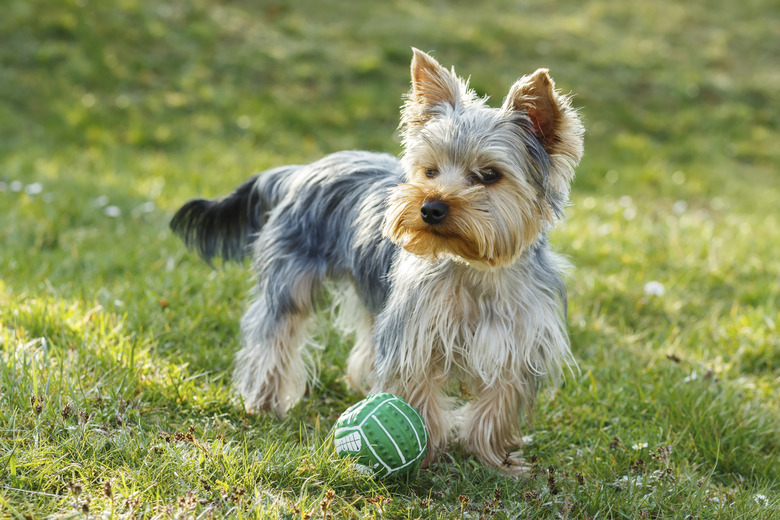How To Stop Aggressive Behavior In My Yorkie
We may receive a commission on purchases made from links.
Cuteness may earn compensation through affiliate links in this article.
Yorkies sport a big personality inside their tiny exterior. The Yorkshire terrier was bred as a rat eradicator, which accounts for his fearless demeanor. Although sweet to their owner, Yorkies can demonstrate aggressive behavior toward strange people or dogs. Left unchecked and untrained, this could develop into a problem behavior.
Why Yorkie aggression issues matter
Why Yorkie aggression issues matter
As a tiny dog weighing just 7 pounds or less according to the breed standards of the American Kennel Club (AKC), a yapping Yorkie pulling at the end of the leash can seem like a non-issue. After all, he's too small to really throw his weight around and is easy to pick up and restrain. You might even think it's cute when he plays the mighty mite.
However, aggression in the dog world is judged by body language, not size. That Labrador he's lunging toward just got challenged to fight by your dog and might choose to respond accordingly. Even usually calm, well-mannered dogs naturally respond to aggression in kind, and your Yorkie stands a good chance of getting injured because of it.
Socialization and training help
Look to the end of your own leash and teach your Yorkshire terrier the same social cues and good manners you would teach a larger dog. Start when your puppy is young. Expose him to people and other dogs, but don't force him to interact, advises Yorkshire Terrier Guide. The anxiety he feels can turn to Yorkie aggression issues if he's not able to withdraw to a safe distance where he feels comfortable.
Your puppy is learning socialization from about 21 days when he begins picking up cues from his littermates to about 1 year old when reaching maturity. According to UC Davis, the pup goes through critical phases affecting social and fear patterns including:
- 3 weeks old to 7 weeks old – Canine socialization with littermates
- 7 weeks to 12 weeks – Human socialization
- 8 to 11 weeks – Fear impact phase where he's especially impressionable to develop anxiety from stress such as mishandling by children, mistreatment, aggressive dogs or humans, etc.
- 13 to 16 weeks – Seniority classification where he's testing dominance boundaries and finding out his role as leader or follower in his home.
- 6 to 14 months – Secondary fear impact period. Avoid soothing tones that only serve to reinforce fear and implement kind and patient training to help him develop self-confidence.
Reward calm behavior in Yorkies
Reward calm behavior in Yorkies
Take treats along on the walk and reward her for calm behavior. These little rewards will help change the mood from general anxiety on the walk to one of pleasure, causing her to be more relaxed overall. Make sure you don't reward your dog with a treat when it's acting aggressive, as this will only serve to perpetuate the pattern.
Bring a few pieces of your dog's kibble along to feed as bite-sized treats along your walk. Royal Canin Yorkshire Terrier Adult Dry Dog Food is specifically designed to fit a Yorkie's short bite pattern. The flavor and aroma appeals to the picky appetite Yorkies can be known for.
Keep calm company
Keep calm company
Choose the company of a calm, stable dog to socialize with. Likewise, teach your children and other family members to be relaxed and calm around the dog and never encourage aggressive behavior even when it's "cute." Although she's tiny, an out-of-control Yorkie can leave a small child scarred both physically and emotionally.
Don't heighten anxiety by scolding your pup; rather, walk him away from the stressful situation. Don't pick him up as this only causes confusion and can heighten the protective response if he feels he's defending you. Enroll in basic obedience classes so your Yorkie sees you as its leader. This will avoid issues with resource-guarding aggression, says the Merck Veterinary Manual, if it sees you as its personal possession that it needs to defend against other humans and animals.
Downplay natural drives
Downplay natural drives
Spaying or neutering your dog before they reach full sexual maturity will prevent them from developing hormone-driven Yorkie aggression issues instinctively aimed at securing and defending a mate.
As Yorkies were bred to hunt rats, they are naturally brave and fearless. Children running and squealing can trigger a dog's prey drive, causing him to give chase and nip. Teach kids proper calm behavior around your Yorkie, including how to hold her comfortably and securely and respect food bowls and other items a dog might feel protective about.
Check their health
Check their health
If your dog used to be easygoing but becomes uncharacteristically cranky, a trip to your veterinarian is in order. Tooth problems, genetic diseases, old age, loss of vision, or stress from a lifestyle change could be at the root. Make notes of the events that preceded the aggressive episodes so your veterinary professional can get to the cause and provide appropriate treatment.
Buy a breed-specific Yorkshire Terrier training and care guide to best understand your Yorkie's disposition and how to deal with it. The Yorkshire Terrier Training: Breed Specific Puppy Training Techniques, Potty Training, Discipline, and Care Guide delivers everything you need to know from puppyhood through old age.
